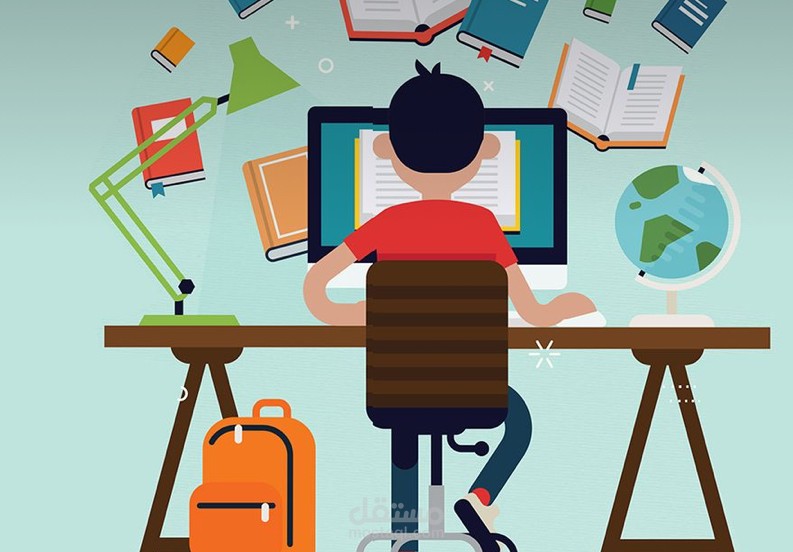The Rise of Self-Directed Learning مقال
تفاصيل العمل
self-directed learning
The Rise of Self-Directed Learning: Empowering Individuals in the 21st Century
In today's rapidly evolving world, the ability to learn independently has become an invaluable skill. Traditional educational models, while important, often struggle to keep pace with the changing demands of the job market and personal growth needs. This is where the power of self-directed learning comes into play, offering individuals the opportunity to take charge of their own educational journeys.
Self-directed learning, at its core, is the process by which learners take the initiative to identify their learning needs, set goals, and select the appropriate resources and strategies to achieve those goals. Unlike the teacher-centric approach of conventional classrooms, self-directed learning places the learner at the center of the process, fostering a sense of ownership and responsibility over one's educational experience.
One of the primary advantages of self-directed learning is its adaptability. Individuals can tailor their learning to match their unique interests, strengths, and career aspirations, rather than being confined to a one-size-fits-all curriculum. This personalized approach not only enhances engagement and motivation but also ensures that the acquired knowledge and skills are directly applicable to the learner's life and goals.
Moreover, self-directed learning encourages the development of critical thinking, problem-solving, and self-regulation skills - essential competencies for success in the 21st-century workforce. As the job market becomes increasingly dynamic, employers seek individuals who can adapt quickly, think creatively, and take the initiative to address challenges. Self-directed learners, equipped with these skills, are well-positioned to thrive in this ever-changing landscape.
The rise of digital technologies has further empowered the self-directed learning movement. Online platforms, open-source educational resources, and virtual learning communities have made it easier than ever for individuals to access a wealth of knowledge and connect with like-minded learners from around the world. These digital tools not only facilitate self-directed learning but also foster a collaborative and supportive learning environment, where individuals can share ideas, receive feedback, and learn from one another.
While the benefits of self-directed learning are numerous, it is important to acknowledge that it also presents certain challenges. Learners must possess a high degree of self-motivation, discipline, and time-management skills to navigate the freedom and autonomy of self-directed learning effectively. Additionally, some individuals may struggle to identify their learning needs or lack the necessary resources and guidance to design and implement an effective learning plan.
To address these challenges, educational institutions and learning organizations are increasingly incorporating self-directed learning elements into their programs, providing learners with the necessary support, structure, and resources to thrive in this mode of learning. By fostering a culture of self-directed learning, we can empower individuals to become lifelong learners, equipped with the knowledge, skills, and mindset to navigate the ever-changing demands of the 21st century.
In conclusion, the rise of self-directed learning represents a significant shift in the educational landscape, empowering individuals to take charge of their own learning journeys. As we move forward, embracing and cultivating this approach will be crucial in preparing learners for the challenges and opportunities of the future.
الترجمة
صعود التعلم الذاتي: تمكين الأفراد في القرن الحادي والعشرين
في عالمنا المتطور بسرعة اليوم، أصبحت القدرة على التعلم بشكل مستقل مهارة لا تقدر بثمن. النماذج التعليمية التقليدية، على الرغم من أهميتها، غالبًا ما تفشل في مواكبة المتطلبات المتغيرة لسوق العمل واحتياجات النمو الشخصي. هنا يأتي دور التعلم الذاتي في اللعب، مما يتيح للأفراد فرصة تولي زمام المبادرة في رحلاتهم التعليمية.
التعلم الذاتي، في جوهره، هو العملية التي يتخذ فيها المتعلمون المبادرة لتحديد احتياجاتهم التعليمية، وتحديد الأهداف، واختيار الموارد والاستراتيجيات المناسبة لتحقيق تلك الأهداف. على عكس النهج المركز على المعلم في الفصول الدراسية التقليدية، يضع التعلم الذاتي المتعلم في مركز العملية، مما يعزز الإحساس بالملكية والمسؤولية تجاه تجربة التعليم الخاصة به.
أحد المزايا الرئيسية للتعلم الذاتي هو قابليته للتكيف. يمكن للأفراد تكييف تعلمهم بحيث يتوافق مع اهتماماتهم الفريدة وقدراتهم واطماحاتهم المهنية، بدلاً من الاقتصار على منهج دراسي موحد. هذا النهج الشخصي لا يعزز فقط الانخراط والدافع، ولكنه يضمن أيضًا أن المعرفة والمهارات المكتسبة قابلة للتطبيق مباشرة على حياة المتعلم وأهدافه.
علاوة على ذلك، يشجع التعلم الذاتي على تطوير مهارات التفكير النقدي وحل المشكلات والتنظيم الذاتي - وهي كفاءات أساسية للنجاح في قوة العمل في القرن الحادي والعشرين. مع تزايد ديناميكية سوق العمل، يبحث أصحاب العمل عن أفراد قادرين على التكيف بسرعة، والتفكير بإبداع، واتخاذ المبادرة لمواجهة التحديات. يتمتع المتعلمون الذاتيون، المزودون بهذه المهارات، بموقع جيد للازدهار في هذا المشهد المتغير باستمرار.
أدى صعود التقنيات الرقمية إلى تمكين حركة التعلم الذاتي بشكل أكبر. منصات الإنترنت والموارد التعليمية المفتوحة المصدر ومجتمعات التعلم الافتراضية جعلت من السهل على الأفراد الوصول إلى ثروة من المعرفة والتواصل مع متعلمين آخرين من جميع أنحاء العالم. تُسهِّل هذه الأدوات الرقمية ليس فقط التعلم الذاتي، ولكن أيضًا تعزز بيئة تعليمية تعاونية وداعمة، حيث يمكن للأفراد تبادل الأفكار وتلقي التعليقات والتعلم من بعضهم البعض.
في حين أن فوائد التعلم الذاتي كثيرة، من المهم الاعتراف بأنه يطرح أيضًا بعض التحديات. يجب أن يمتلك المتعلمون درجة عالية من الدافع الذاتي والانضباط ومهارات إدارة الوقت للتنقل بفعالية في حرية وأصالة التعلم الذاتي. بالإضافة إلى ذلك، قد يواجه بعض الأفراد صعوبة في تحديد احتياجاتهم التعليمية أو افتقار الموارد والتوجيه اللازمين لتصميم وتنفيذ خطة تعلم فعالة.
لمعالجة هذه التحديات، تقوم المؤسسات التعليمية ومنظمات التعلم بتضمين عناصر التعلم الذاتي في برامجها بشكل متزايد، مما يوفر للمتعلمين الدعم والهيكلة والموارد اللازمة للنجاح في هذا النمط من التعلم. من خلال تعزيز ثقافة التعلم الذاتي، يمكننا تمكين الأفراد ليصبحوا متعلمين مدى الحياة، مزودين بالمعرفة والمهارات والعقلية اللازمة للتنقل في متطلبات القرن الحادي والعشرين المتغيرة.
في الختام، يمثل صعود التعلم الذاتي تحولًا كبيرًا في المشهد التعليمي، مما يمنح الأفراد القدرة على توجيه رحلاتهم التعليمية بأنفسهم. وأثناء المضي قدمًا، سيكون من الحاسم اعتناق وتنمية هذا النهج في إعداد المتعلمين للتحديات والفرص في المستقبل.
بطاقة العمل
| اسم المستقل | Albandari M. |
| عدد الإعجابات | 0 |
| عدد المشاهدات | 4 |
| تاريخ الإضافة |
